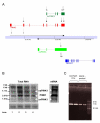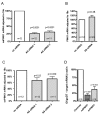The human PINK1 locus is regulated in vivo by a non-coding natural antisense RNA during modulation of mitochondrial function
- PMID: 17362513
- PMCID: PMC1831481
- DOI: 10.1186/1471-2164-8-74
The human PINK1 locus is regulated in vivo by a non-coding natural antisense RNA during modulation of mitochondrial function
Abstract
Background: Mutations in the PTEN induced putative kinase 1 (PINK1) are implicated in early-onset Parkinson's disease. PINK1 is expressed abundantly in mitochondria rich tissues, such as skeletal muscle, where it plays a critical role determining mitochondrial structural integrity in Drosophila.
Results: Herein we characterize a novel splice variant of PINK1 (svPINK1) that is homologous to the C-terminus regulatory domain of the protein kinase. Naturally occurring non-coding antisense provides sophisticated mechanisms for diversifying genomes and we describe a human specific non-coding antisense expressed at the PINK1 locus (naPINK1). We further demonstrate that PINK1 varies in vivo when human skeletal muscle mitochondrial content is enhanced, supporting the idea that PINK1 has a physiological role in mitochondrion. The observation of concordant regulation of svPINK1 and naPINK1 during in vivo mitochondrial biogenesis was confirmed using RNAi, where selective targeting of naPINK1 results in loss of the PINK1 splice variant in neuronal cell lines.
Conclusion: Our data presents the first direct observation that a mammalian non-coding antisense molecule can positively influence the abundance of a cis-transcribed mRNA under physiological abundance conditions. While our analysis implies a possible human specific and dsRNA-mediated mechanism for stabilizing the expression of svPINK1, it also points to a broader genomic strategy for regulating a human disease locus and increases the complexity through which alterations in the regulation of the PINK1 locus could occur.
Figures



References
-
- Valente EM, Abou-Sleiman PM, Caputo V, Muqit MM, Harvey K, Gispert S, Ali Z, Del Turco D, Bentivoglio AR, Healy DG, Albanese A, Nussbaum R, Gonzalez-Maldonado R, Deller T, Salvi S, Cortelli P, Gilks WP, Latchman DS, Harvey RJ, Dallapiccola B, Auburger G, Wood NW. Hereditary early-onset Parkinson's disease caused by mutations in PINK1. Science. 2004;304:1158–1160. doi: 10.1126/science.1096284. - DOI - PubMed
-
- Petit A, Kawarai T, Paitel E, Sanjo N, Maj M, Scheid M, Chen F, Gu Y, Hasegawa H, Salehi-Rad S, Wang L, Rogaeva E, Fraser P, Robinson B, St George-Hyslop P, Tandon A. Wild-type PINK1 prevents basal and induced neuronal apoptosis, a protective effect abrogated by Parkinson disease-related mutations. J Biol Chem. 2005;280:34025–34032. doi: 10.1074/jbc.M505143200. - DOI - PubMed
-
- Beilina A, Van Der Brug M, Ahmad R, Kesavapany S, Miller DW, Petsko GA, Cookson MR. Mutations in PTEN-induced putative kinase 1 associated with recessive parkinsonism have differential effects on protein stability. Proc Natl Acad Sci U S A. 2005;102:5703–5708. doi: 10.1073/pnas.0500617102. - DOI - PMC - PubMed
Publication types
MeSH terms
Substances
LinkOut - more resources
Full Text Sources
Other Literature Sources
Research Materials

